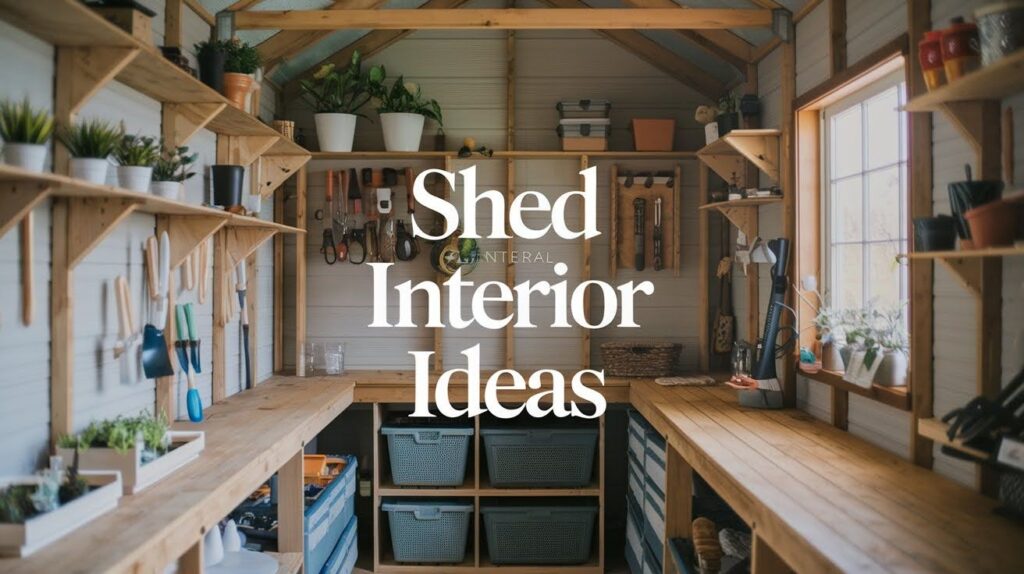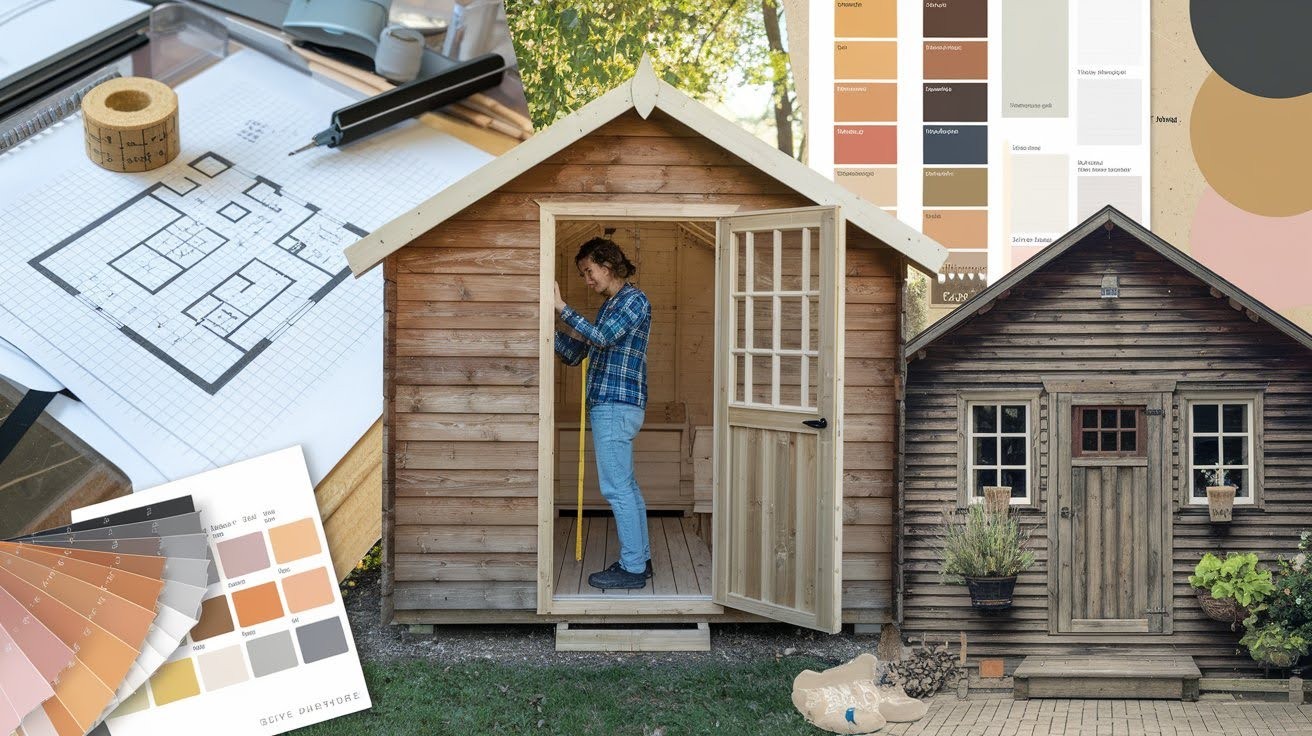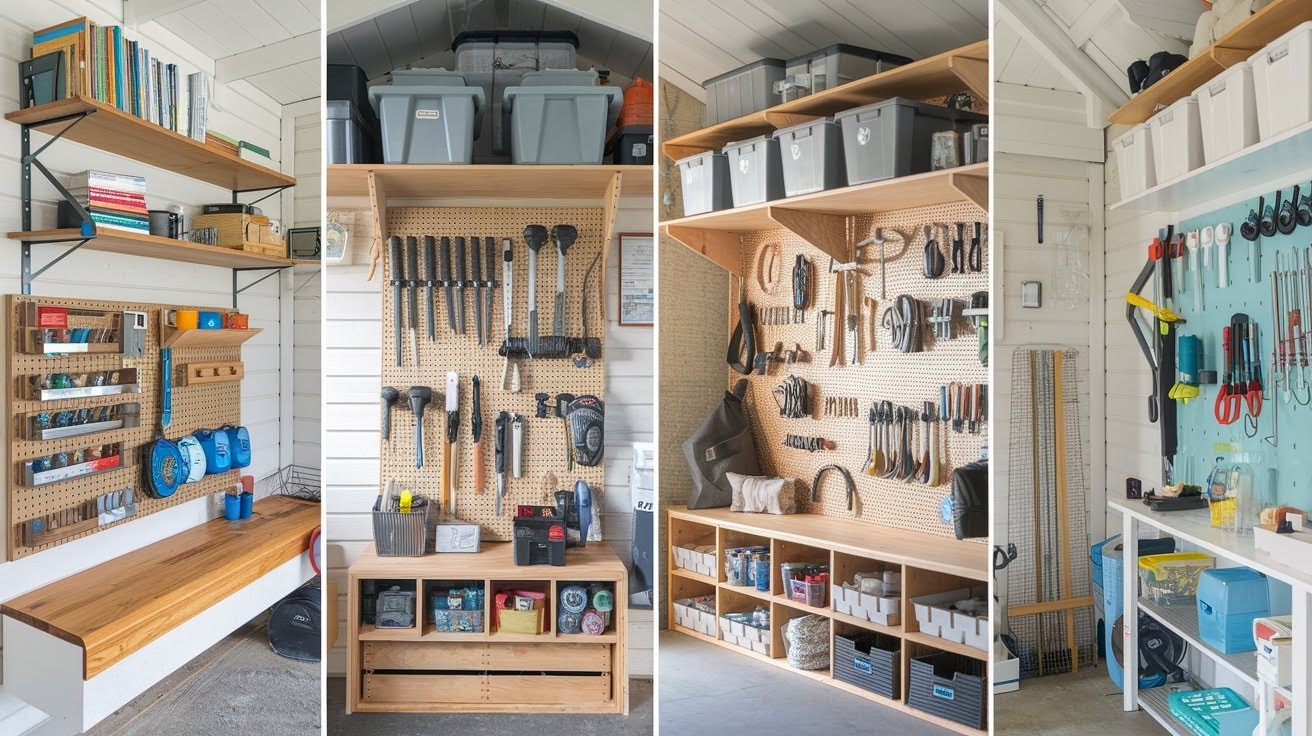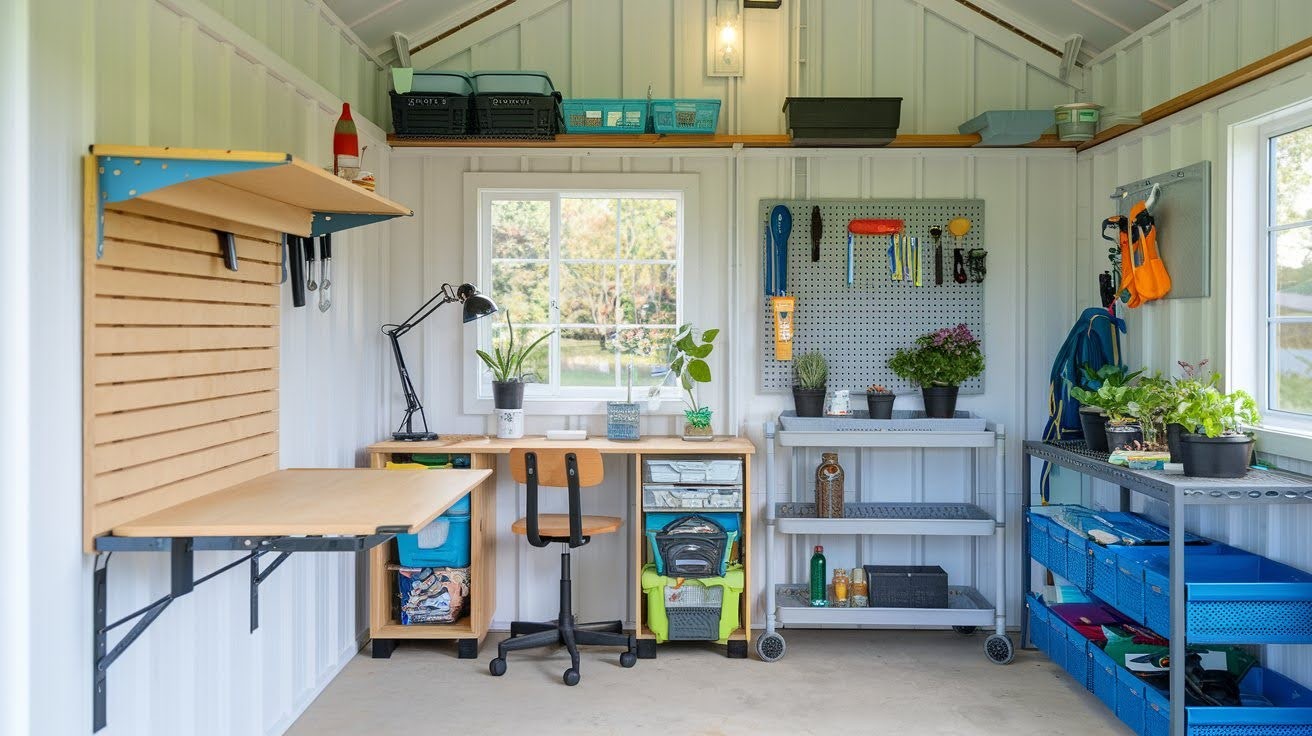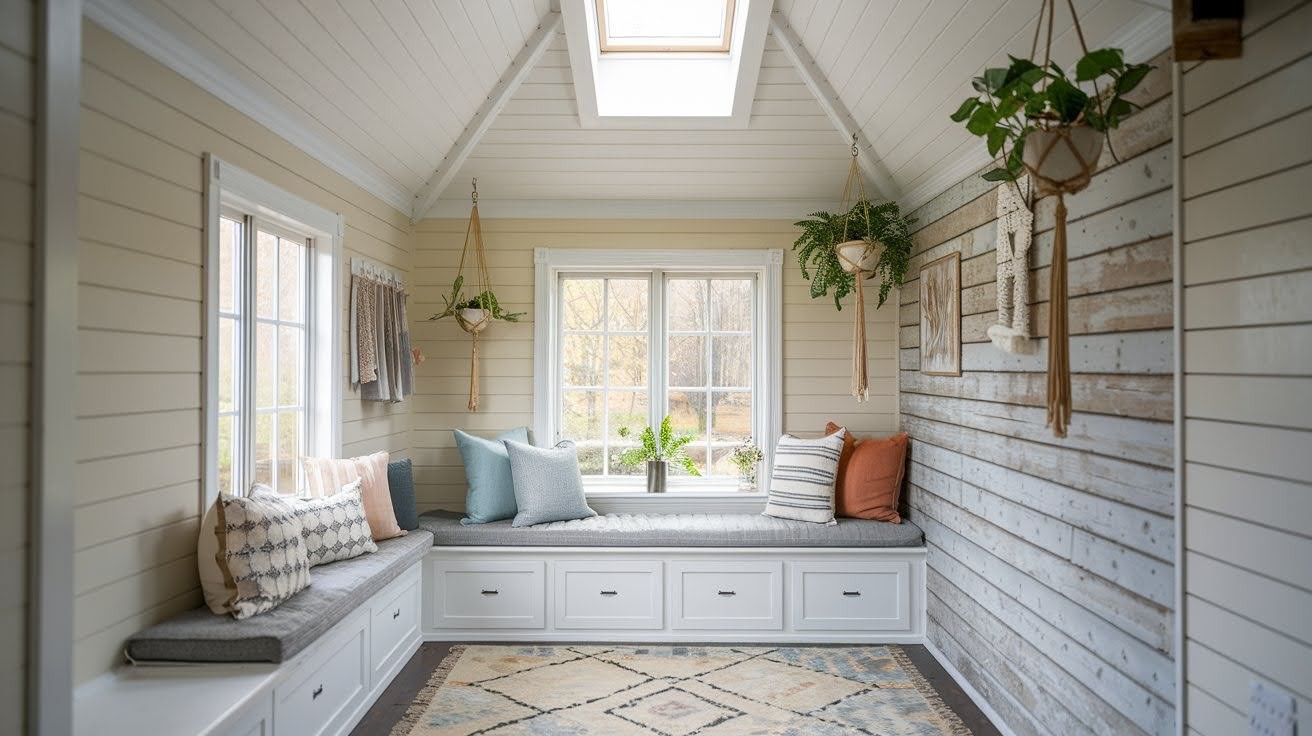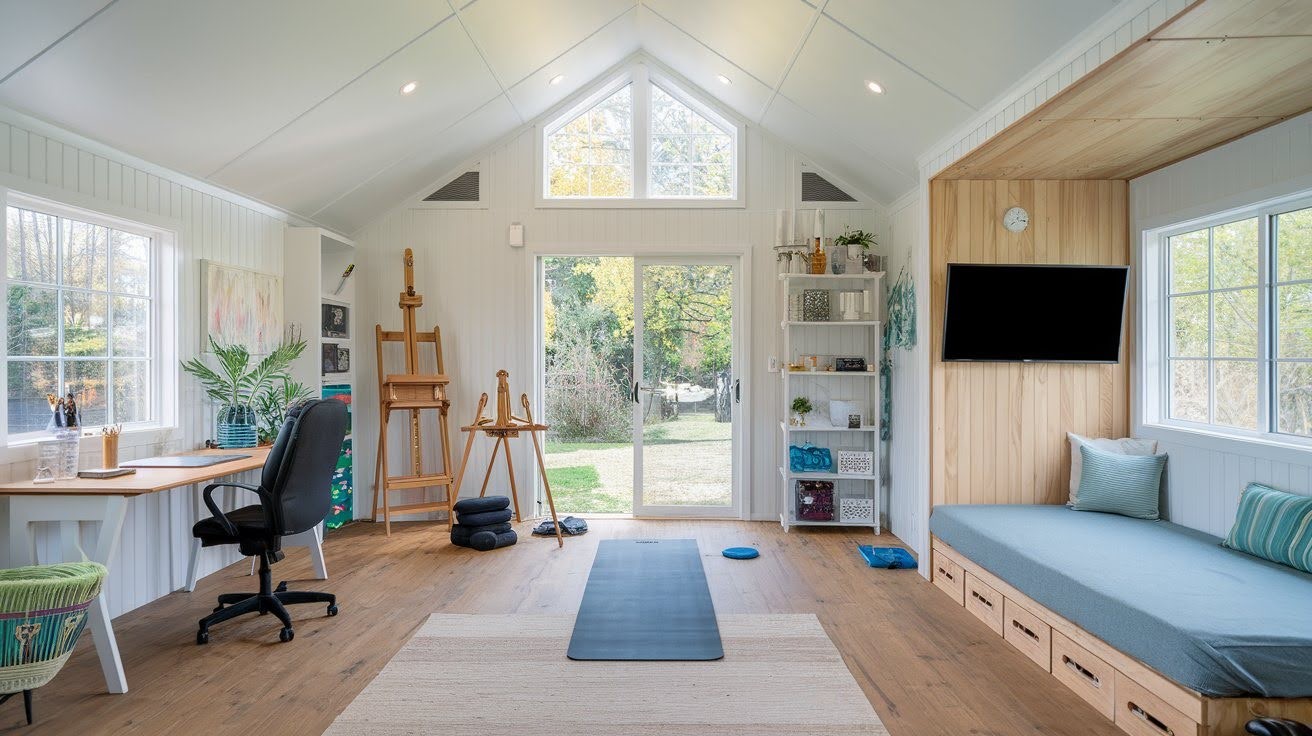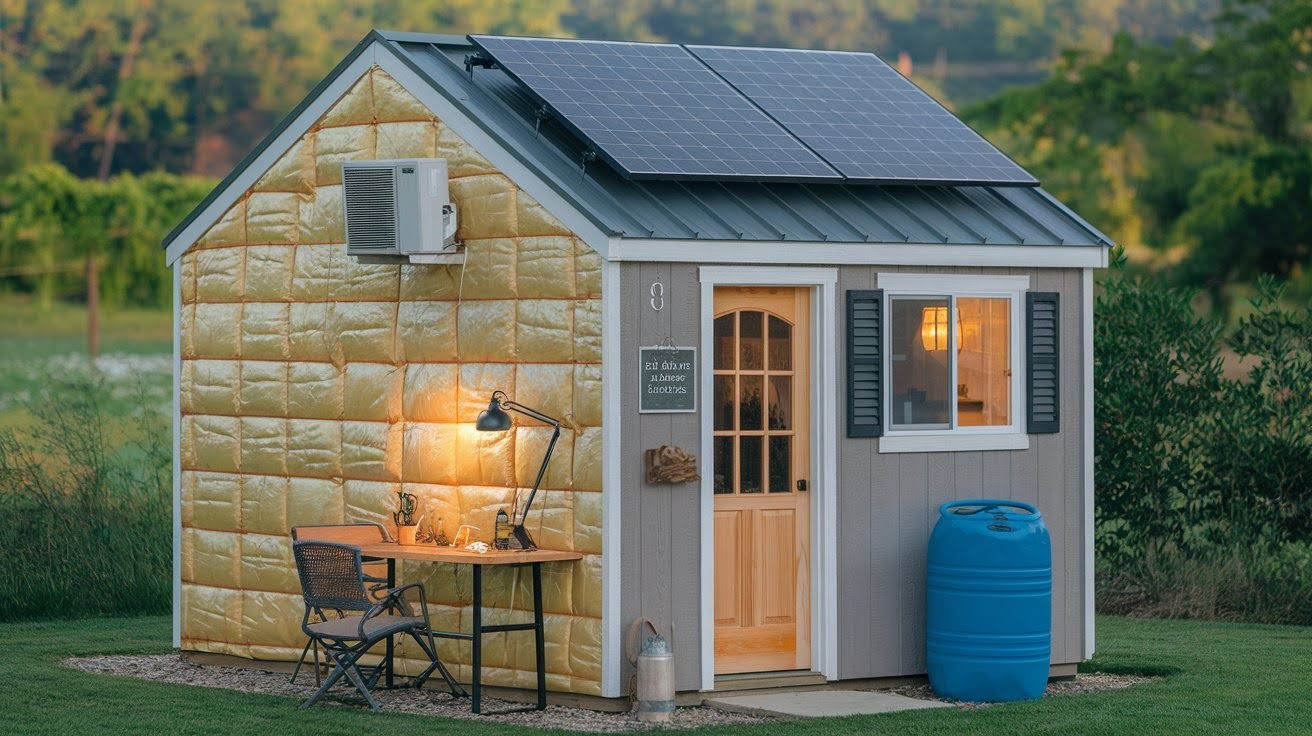Your small shed is wasting space right now. I know because mine did too.
After working on three sheds for years, I’ll show you exactly how to maximize every square inch. You’ll learn smart storage solutions, functional workspace ideas, and comfort upgrades that actually work.
This guide covers step-by-step planning, organization tricks, conversions, and energy solutions. I’ve made the mistakes so you don’t have to.
I’ve helped dozens of neighbors change their sheds into offices, studios, and retreats. The methods in this article come from real experience, not theory.
By the end, you’ll have a clear plan to turn your cramped shed into your favorite space. Your small shed interior problems end today.
Step-by-Step Guide to Planning Your Small Shed Interior
Step 1: Define Your Shed’s Purpose
First things first. What do you actually need this space for?
I made the mistake of trying to cram everything into mine at first. Big error. Pick one primary function and maybe one secondary use.
Popular shed purposes:
- Home office or workspace
- Art and craft studio
- Garden tool storage
- Exercise or yoga space
- Kids’ playhouse
- Guest retreat
Write down your main purpose. Everything else flows from this decision.
Step 2: Measure and Map Out the Space
Grab your measuring tape. I’m serious about this step. Measure twice, buy once. You’ll thank me later when your new workbench actually fits through the door.
Here’s what to measure:
- Floor dimensions (length x width)
- Wall heights
- Door and window openings
- Any obstacles (support beams, electrical boxes)
Sketch it out on graph paper or use a free app. Nothing fancy needed.
Step 3: Choose a Style That Fits You
Your shed doesn’t have to look like a boring storage box.
I went with a rustic farmhouse vibe using reclaimed wood and vintage finds. You might prefer modern minimalist or cozy cottage.
Pick a style that makes you happy. You’ll be spending time here, so make it yours.
Smart Storage Ideas
Small spaces need smart solutions. Here’s how I used every inch.
1. Use Your Walls
Your walls are prime real estate. Don’t waste them.
I installed floating shelves from floor to ceiling on one wall. Store books, supplies, or display items without eating up floor space. Get brackets that can hold at least 50 pounds. You’ll want to load these up.
2. Add Pegboards
Pegboards are like the Swiss Army knife of organization.
Mount one behind your workbench or desk. Everything has a home, and everything stays visible. No more digging through drawers for that one screwdriver. Get the metal ones. They’re sturdier than the fiber versions.
3. Hidden Storage Under Seating
Every piece of furniture should work twice as hard in a small shed.
I built a window seat with storage underneath. Perfect for cushions, seasonal items, or anything I don’t need daily access to.
4. Overhead Storage
Got high ceilings? Lucky you.
Build a simple loft platform near the roof. Store Christmas decorations, camping gear, or anything used once or twice a year. Just make sure you can safely reach it with a step ladder.
5. Magnetic Strips for Small Tools
Magnetic strips aren’t just for kitchens.
Mount them on your workbench or wall to hold screwdrivers, scissors, craft knives. Small tools stay organized and within reach. Heavy-duty magnetic hooks work great for larger items too.
Functional Workspaces
Now let’s create spaces that actually work for you.
6. Fold-Down Workbench
Space flexibility is key in small sheds.
A fold-down workbench gives you a full workspace when needed, then tucks away flat against the wall. Perfect for sheds that serve multiple purposes.
7. Simple Desk Setup
Working from your shed? Smart move. Keep your desk simple and uncluttered. A small writing desk or even a floating shelf can work perfectly.
Good lighting is important. Position your desk near a window if possible, and add a quality desk lamp.
8. Potting Station
Garden sheds need dedicated plant workspace.
Create a potting station with shelves above and storage below. Include hooks for tools and a small sink if you have water access. Use materials that handle moisture well. Cedar or treated lumber works great.
9. Rolling Storage Carts
Rolling carts are brilliant in tight spaces.
Build or buy narrow carts that fit between your workbench and wall. Roll them out when working, tuck them away when done. I have three different carts for different projects. Complete game changer.
10. Multi-Purpose Table
Some sheds need to be social spaces too.
A sturdy table can serve for crafting, dining, or meetings. Choose one that’s easy to clean and can handle different activities. Add good storage underneath for supplies or dishes.
Comfort and Style
Let’s make your shed a place you actually want to spend time.
11. Natural Light
Natural light changes small spaces completely.
I added a small skylight above my desk area. The difference is incredible. The space feels twice as large and infinitely more welcoming. Solar tubes are cheaper and easier to install than traditional skylights.
12. Light Colors
Dark colors make small spaces feel cramped.
Paint your walls in light, neutral colors. White, cream, or pale gray work wonderfully. Save bright colors for accents like throw pillows or artwork. Your ceiling should be the lightest color of all.
13. Add Soft Touches
Hard surfaces need softening.
A good rug defines your space and adds warmth underfoot. Throw pillows on seating make everything more inviting. Choose washable fabrics for easy maintenance.
14. Accent Walls
One accent wall adds character without overwhelming the space.
Shiplap, reclaimed barn wood, or even painted plywood can create nice focal walls. Keep the other walls simple to avoid visual chaos.
15. Plants
Plants bring life to any space.
Choose low-maintenance varieties that handle your shed’s light conditions. Snake plants, pothos, or succulents work great in most situations. Hanging plants save precious floor space while adding vertical interest.
Popular Shed Conversions
Ready to get creative? Here are some amazing shed conversion ideas.
16. Home Office
The home office shed is hugely popular right now.
Start with good insulation and electrical. Add a compact desk, comfortable chair, and plenty of storage. Don’t forget reliable internet access.
17. Art Studio
Artists love shed studios.
Maximize natural light and add task lighting everywhere. Storage is important for supplies and works in progress. Consider a utility sink if your crafts get messy.
18. Workout Space
Your personal fitness sanctuary awaits.
Install mirrors on one wall to make the space feel larger. Add rubber flooring for comfort and safety. Ventilation is super important for workout spaces. Keep equipment minimal and useful for multiple exercises.
19. Guest Space
Occasional guests love a private retreat.
A daybed or futon provides seating and sleeping. Add a small side table, reading lamp, and hooks for hanging clothes. Include a small basket with fresh linens for that hotel touch.
20. Gaming or Entertainment Nook
Gamers and movie lovers need their space too.
Mount your TV or gaming setup on the wall to save space. Comfortable seating is key for long sessions. Sound dampening helps keep the peace with neighbors.
Energy and Utilities
Let’s make your shed comfortable year-round.
21. Insulation
Insulation makes everything better.
I used spray foam insulation in my shed. Worth every penny. Your space stays comfortable and energy costs stay low. Don’t forget to insulate the ceiling too.
22. Temperature Control
Temperature control extends your shed’s usability.
Mini-split systems work great but require professional installation. Portable units are easier but less efficient. Electric space heaters and fans work for smaller sheds.
23. Good Lighting
Good lighting makes or breaks a small space.
Layer your lighting overhead for general illumination, task lighting for work areas, and accent lighting for ambiance. Smart switches let you control everything from your phone.
24. Solar Panels for Energy
Going off-grid? Solar power is amazing.
A small solar setup can power lights, fans, and small devices. Battery backup keeps things running when the sun doesn’t shine. Start small and expand as needed.
25. Rainwater Collection
Garden sheds benefit from water access. Install gutters and a rain barrel system. Free water for your plants and less impact on your utility bill.
Add a simple pump for easy watering.
Pro Tips
After working on multiple sheds, here’s what I’ve learned:
- Think vertically first. Floor space is precious, but wall space is abundant.
- Use every nook and cranny. That weird corner? Perfect for a narrow shelf.
- Choose furniture that serves multiple purposes. Storage ottoman, fold-down desk, rolling cart.
- Keep your color palette simple. Too many colors make small spaces feel chaotic.
- Plan for growth. Your needs will change, so build flexibility into your design.
- Don’t forget ventilation. Even insulated sheds need fresh air circulation.
Common Mistakes to Avoid
Learn from my errors so you don’t repeat them:
- Don’t skip the planning phase – I rushed into my first shed project and wasted money on wrong-sized items
- Avoid trying to fit too much in – Less is truly more in small spaces
- Don’t ignore electrical needs early – Running power later is expensive and disruptive
- Skip the cheap storage solutions – They break quickly and create clutter
- Don’t forget about door clearance – Measure twice, especially for larger furniture pieces
Final Thoughts
Your small shed has amazing potential. Start with one area and build from there. You’ll be shocked at how much function and beauty you can pack into a tiny space.
I’ve given you everything I learned from working on multiple sheds. The planning steps, storage tricks, and design ideas that actually work. Now it’s your turn to take action.
Pick one section from this guide and start this weekend. Maybe it’s adding vertical storage or creating a simple workspace. Small steps lead to big changes.
Your dream shed space is closer than you think. I started with a cramped, boring storage box and ended up with my favorite room in the house.
What will you tackle first in your shed makeover? Start today and watch your tiny space change into something amazing.
Frequently Asked Questions
How much does it cost to change a small shed interior?
A basic shed makeover costs between $200-500 for essentials like insulation, flooring, and storage. A complete renovation with electrical, furniture, and decor can range from $1000-2500 depending on your choices.
Do I need a permit to renovate my shed interior?
Most interior shed renovations don’t require permits unless you’re adding electrical or plumbing. Always check with your local building department to avoid problems later when selling your home.
What’s the best flooring for a small shed?
Vinyl plank flooring works great for most shed uses because it’s waterproof and easy to install. For workshop sheds, consider rubber mats that handle dropped tools and provide comfort while standing.
How do I keep my shed comfortable in winter?
Insulation is your first priority, followed by a reliable heat source like a mini-split or electric heater. Seal all gaps around doors and windows to prevent drafts and heat loss.
Can I use my shed as a home office year-round?
Yes, with proper insulation, heating, cooling, and reliable internet access. You’ll also need adequate electrical outlets for computers, lighting, and other office equipment.

